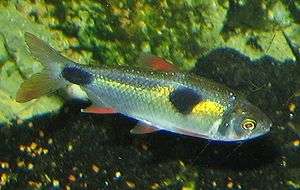Bucktooth tetra
| Bucktooth tetra | |
|---|---|
 | |
| Scientific classification | |
| Kingdom: | Animalia |
| Phylum: | Chordata |
| Class: | Actinopterygii |
| Order: | Characiformes |
| Family: | Characidae |
| Genus: | Exodon J. P. Müller & Troschel, 1844 |
| Species: | E. paradoxus |
| Binomial name | |
| Exodon paradoxus J. P. Müller & Troschel, 1844 | |
| Synonyms | |
|
Epicyrtus paradoxus | |
The bucktooth tetra (Exodon paradoxus) is the only member of the genus Exodon and is a freshwater fish of the characin family (family Characidae) of order Characiformes. It is native to the Amazon Basin and Guyana. Though first described in 1845, it was not imported and distributed by the aquarium trade until 1932.
This species is of typical elongated tetra appearance; it is light tan in appearance with two distinct black spots (one before the tail and another below the dorsal fin). The dorsal fin is bright red. The name is quite contradictory of the actual fish however, with Bucktooth tetras showing no signs of actual teeth. It grows to a maximum overall length of approximately 12 cm (4.7 in).
The fish's natural diet consist of small invertebrates, other fish, and plants. It is not a safe tank mate for fellow tetras because it will eat small fish and it is not a safe tank mate for larger species because it is a notorious lepidophage. Bucktooth tetra are best alone or in large planted tanks with adequate coverage for other species. They are best kept in shoals of 8 or more; a shoal that is less than 8 will pick at each other and stress the exodons to a point where it will catch some disease or will die of severe wounds. It is otherwise extremely hardy and can live in home aquaria for more than ten years.
See also
References
- Froese, Rainer and Pauly, Daniel, eds. (2006). "Exodon paradoxus" in FishBase. July 2006 version.
- Innes, W. T. Exotic Aquarium Fishes, 19th ed. Innes Publishing Co. Philadelphia. 1956.